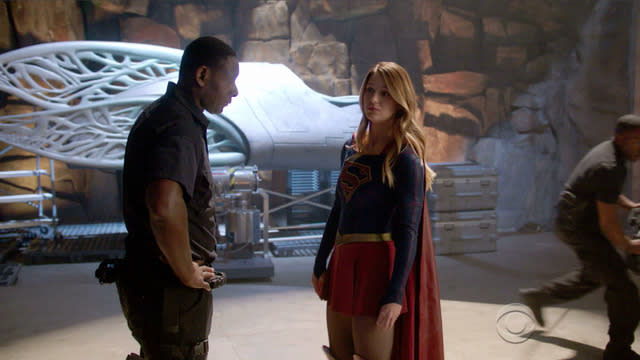Should Networks Change Episodes After a Tragedy?
In the wake of Friday’s tragic attacks in Paris, CBS has decided that fighting terrorism isn’t a job for Supergirl. At least, not right now. Over the weekend, the network announced that “out of sensitivity and respect to the events that occurred” they would be delaying the fourth episode of its popular comic book series, as well as the next scheduled installment of Supergirl’s Monday night crimefighting companion, NCIS: Los Angeles.
And when you read the descriptions for both episodes, the decision is understandable, as they each involve storylines that bear an unmistakable, if unintentional, resemblance to real life events. In “How Does She Do It,” for example, the Girl of Steel’s twin identities as Kara Danvers and Supergirl collide when she races back and forth between a babysitting gig for her boss’s young son and saving National City from a bomber who is setting off explosions all over the teeming metropolis. “Defectors,” meanwhile, tasks the L.A. branch of NCIS with investigating women who have been recruited into terrorism by ISIS.

Neither storyline is directly analogous to the situation in Paris, but they do echo incidents that have been emblazoned in the headlines since Friday night. And CBS isn’t alone in sounding a note of caution about their programing; on Nov. 14, HBO scrapped plans to air a live U2 concert direct from the City of Light, while TNT announced that tonight’s Paris-set episode of the Sean Bean action series, Legends, would be postponed as well.
All things considered, having to wait a little longer to watch an hour of television isn’t exactly a sacrifice, particularly if real-world events make it difficult for you to enjoy that hour of television. Fans of Mr. Robot learned that earlier this year, when the USA drama’s freshman season finale was delayed a week because of a pivotal scene involving an at-close-range shooting that would have aired hours after footage from a real life murder played out on live television and social media. In that case, the shock of the real word incident might have unintentionally emphasized the shock value — rather than the dramatic importance — of the fictional shooting, which, it should be stressed, took place under very different circumstances. The week-long wait allowed viewers to watch and appreciate Mr. Robot on its own terms, without opening a wound that may still have been fresh in their minds.

On the other hand, Mr. Robot is written and directed to reflect our world…albeit a deeply skewed version of it. The same goes for NCIS, a franchise that draws on real science and military news for dramatic stories. Genre shows like Supergirl take place in a universe removed from our own and, as a result, perhaps have a different relationship with their fans. Back in 1999, The WB delayed two Season 3 episodes of Buffy the Vampire Slayer in the wake of the Columbine school shootings: “Earshot” and the season finale, “Graduation Day, Part 2.”
At the time, the network cited concerns about depicting violence in the hallways of the fictional Sunnydale High School. But Buffy’s supernatural mythology placed those sequences in a heightened reality that viewers could clearly distinguish from our own. And “Earshot” in particular made smart use of the metaphorical underpinnings that are part of the best genre entertainment, allowing viewers to process and ponder upsetting subject matter by placing it in a different context. It’s entirely possible that watching Supergirl swoop in to save the day and stop a mad bomber would provide relief to viewers who are still unsettled by the terrifying news footage from Paris. If only tragedies like that could be eliminated as easily as episodes of television.
So what do you think? Should networks alter their lineups in the wake of tragedies like the attacks in Paris? Post your thoughts in the comments.


